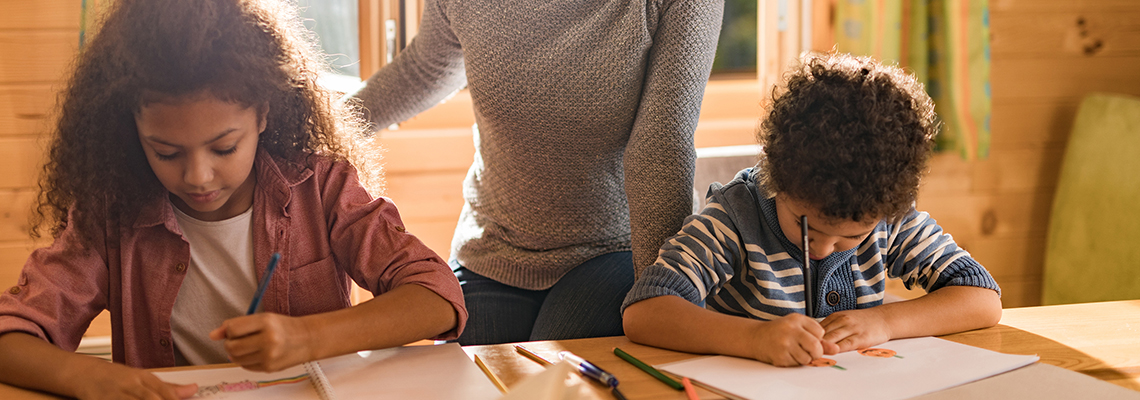
It is 11:00am on a school day and an estimated 55 million children in the United States are not in class today[1] Instead, over 90% of school-aged youth are hunkered down at home while their caregivers ask themselves, “Can I do this?” Right now, over 120,000 U.S. schools are closed—many for the remainder of the school year. Basements and bedrooms have become classrooms and parents are challenged to create conditions that promote sustained engagement in learning.
Parents, you CAN do this. Here are some ideas for promoting youth engagement in learning and self-motivation during the COVID-19 pandemic.
Harness Natural Interests
All of us are naturally drawn to certain activities and interests. Assign academic activities related to your child’s natural interests. Look to build skills in the context of these interests. You can suggest that your child write an essay on the process of developing a video game, give a speech on the life of his/her favorite musical artist, take a virtual museum tour, or interview a favorite relative about a historical event. Working on high interest topics will keep your kids on task for longer periods of time without adult assistance.
Practice Goal Setting
Start out each day by asking your kids to set three daily schoolwork goals. Make sure the goals are challenging but fair and that you can tell if the goals were met. Can you see the finished product? Will you be around to monitor if they spent 30 minutes on math work? Come up with a daily reward for anyone who meets all three goals. These can range from special snacks to Zoom dates with friends or playing Xbox. A menu of rewards can include several options, which mixes up the reward of the day!
Reduce Distractions
Make a list of key distractions ahead of time that draw your child off-task. Should the cell phone be placed in the kitchen during schoolwork? Does sitting at the window lead to excessive people watching? Remove distractions yourself – rather than ask children to do it. Schoolwork should be completed in a location that promotes parent monitoring but minimizes distractions such as electronics and other family members.
Remember the Why
This tip is especially important for teenagers, who may need to pass an upcoming AP exam, fulfill course requirements, or complete a long-term project. Help teenagers remember personal reasons why they want to produce high quality school work. Make an art project with these reasons to hang on the wall or help them to generate self-statements to repeat when work feels boring. “I want to go to college out of state.” “I need to maintain a 3.0.” “Keep my driving privileges!”
Embrace Structure
Use a daily routine that is consistent each week. Include wake-up time, get dressed in school clothes, and schedule periods with different subjects. Keeping the plan and expectations clear will help academic work become a habit. If you can, find a designated place for schoolwork and only schoolwork. Remember the routine can be fun! Integrate physical activity, video study groups, and creative time into rotating blocks. Set up the routine to leverage motivation (i.e., math work needs to be complete before we can move on to art or cooking!). Schedule breaks between activities to allow time to transition. These breaks are the appropriate time for using the bathroom, getting a snack or a drink, finding materials for the next activity or stretching. Scheduled breaks will reduce the need to interrupt activities for these requests.
Maximize Choice
Involve your children as much as possible in the details of schooling. The more control they feel over the circumstances, the better they will engage. Create choices just to let them feel involved. “Do you want to have music or art today?” “Should we hold reading time on the porch or in the kitchen?” “Do you want to learn about dinosaurs or polar bears!?” But be careful not to offer choices that you cannot make good on.
Avoid Becoming TOO Involved
Sometimes the easiest way for schoolwork to be over is to jump in and do it yourself. Resist this temptation. Avoid helping too much with work, taking over, or sitting down one-on-one for long periods of time—these practices reduce motivation to complete work independently. The best way to help your child is through planning and goal setting together. Sit down at the beginning of the day (or each period) and ask your child to make a work plan that is realistic. Ask to see proof that the work was completed prior to moving on to fun or enjoyable activities.
If your child is struggling, reach out to the teacher to check the workload’s appropriateness. Let the school know if your child is falling far behind or their focus problems are causing distress. Students with Individualized Education Plans (or “Section 504 plans”) remain entitled to their accommodations during social distancing. Be assertive with school staff about your student’s rights. If new difficulties with focus emerge or continue over time, seek professional support. Health practitioners, including mental health providers, continue to provide remote services during the COVID-19 pandemic.
Learn a New Skill
Challenge your child to identify a new skill to learn during social distancing. For example, a nine-year-old girl on my block is building a skate ramp with power tools! A middle schooler I know is learning to play guitar for the first time. High schoolers are learning computer programming, practicing how to drive, and mastering the art of baking bread. Kids are learning a foreign language and training for their first 5K run. Use multiple choice to present options to younger or indecisive children. When all this is over, they will look back and say, “that was the time I learned how to do X!” Who knows, maybe “X” will spark a new passion, forge a career path, or provide a big boost to your child’s self-esteem.
Reject Perfection
Given the stress of a pandemic, relax expectations for your child (and yourself) and try to focus on small positive steps each day. Keep an eye on your child’s health and wellbeing and place their basic needs before their academic achievement. There will be plenty of time to catch up when all this is over. All families need to find their best-case scenario, which is often far from perfect. When parents are essential workers who cannot stay home to monitor schoolwork, engage a neighbor, family member, or college student who has nearly no exposure to others. Educate yourself on childcare resources for essential workforce members in your community. Do what you can.
Parents, you CAN do this.
1. Coronavirus and School Closures (2020, April 9). Education Week. Retrieved April 10 2020, from
https://www.edweek.org/ew/
Resources
Managing attention and learning struggles during social distancing
https://chadd.org/guidance-for-uncertain-times/
Tips for parents during social distancing.
https://www.apa.org/topics/covid-19/quarantine-parents-tips
Sibley, M.H (April 18, 2020). Helping Kids Stay Motivated for Learning during Social Distancing. https://infoaboutkids.org/blog/helping-kids-stay-motivated-for-learning-during-social-distancing/
















